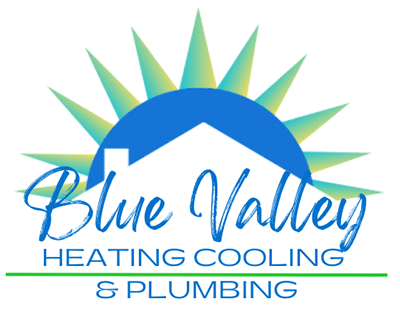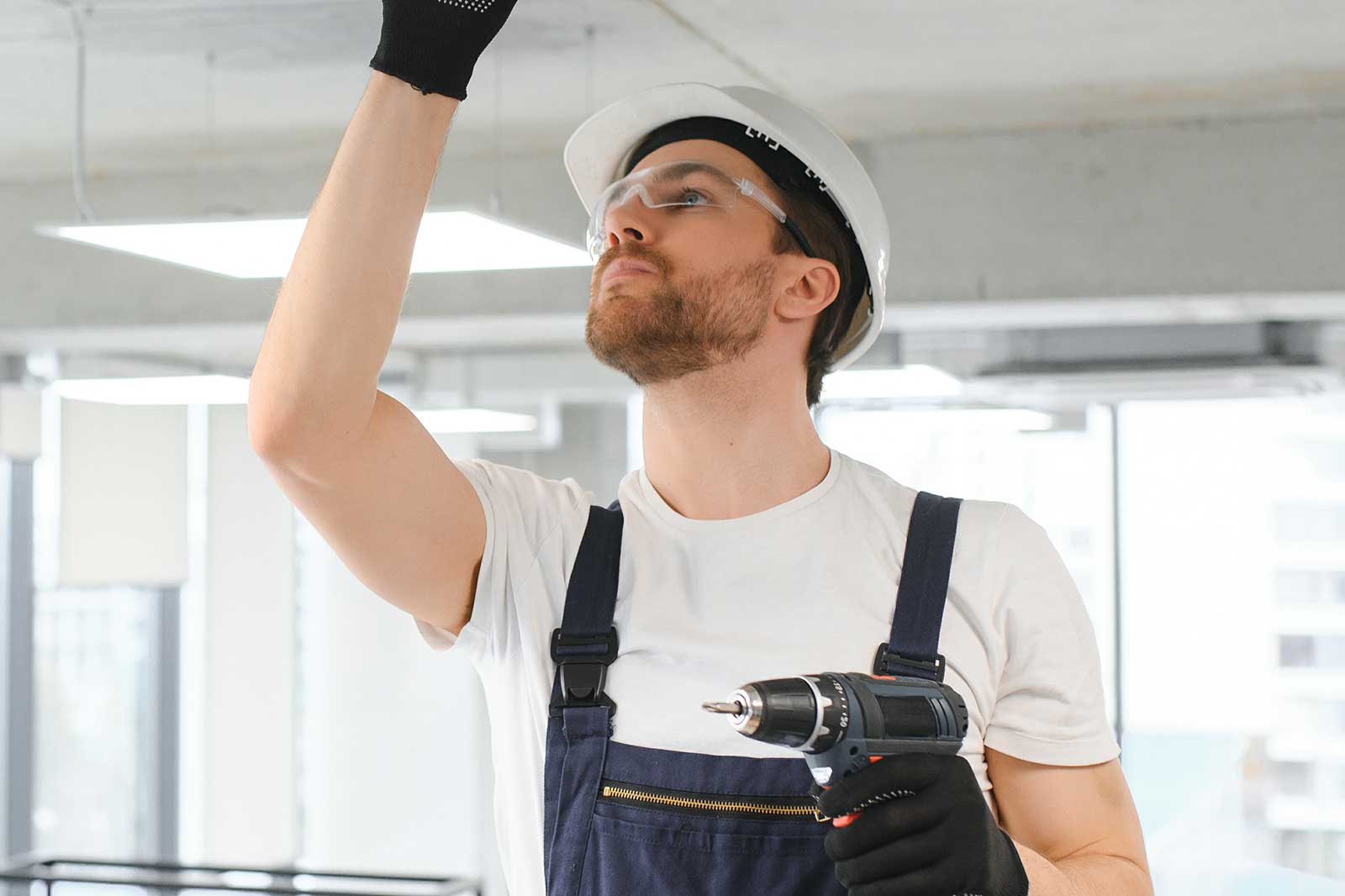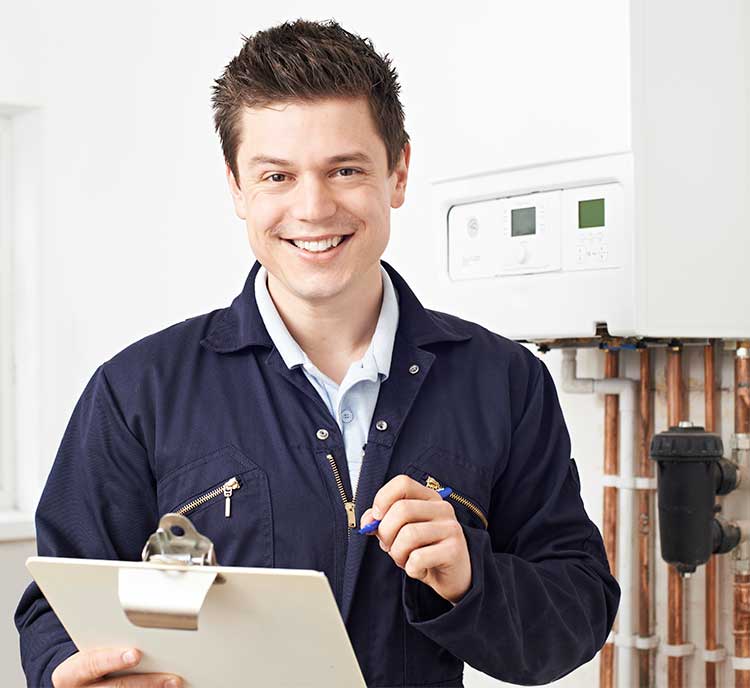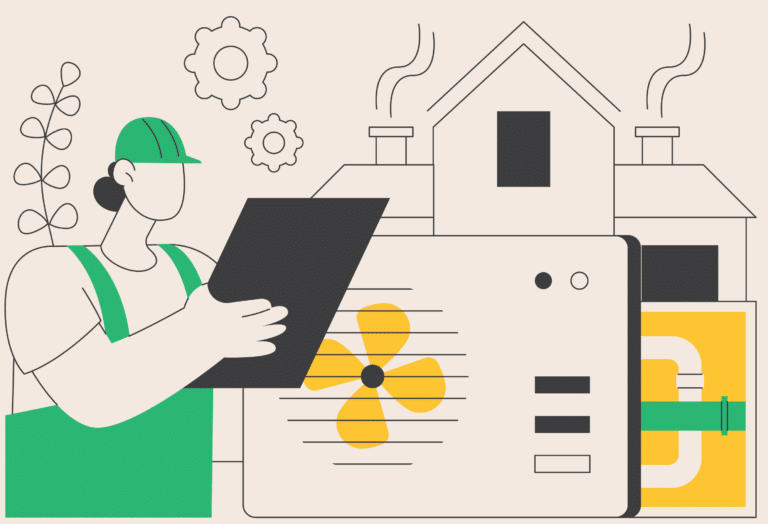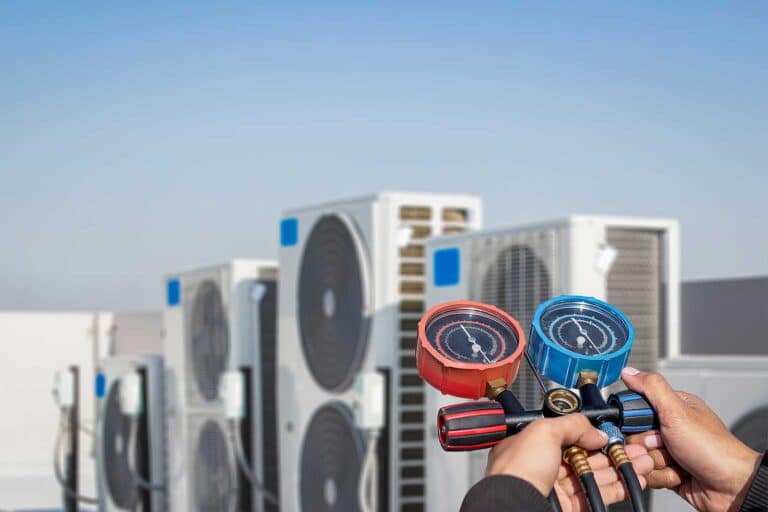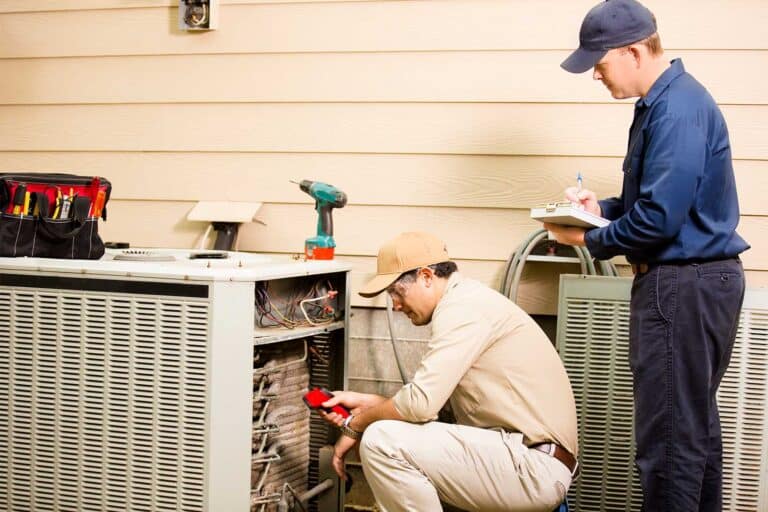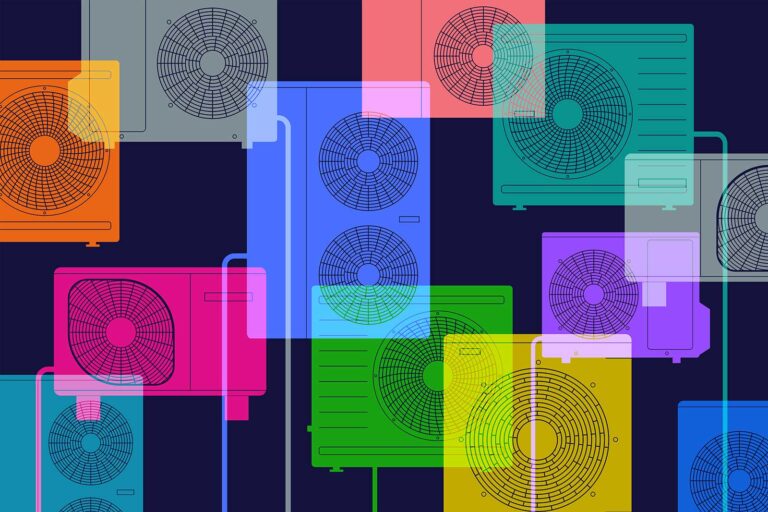Top Reasons Your HVAC System Needs Repairs
Your HVAC system is important for keeping your home comfortable and healthy. It controls heating, ventilation, and air conditioning.
Just like any machine, your HVAC system can wear out over time and may need repairs because of regular use. Handling these repairs on a timely basis can keep these repairs from escalating into major problems. Energy.gov says the top reasons for and HVAC system needing repairs are:
- Refrigerant Leaks
- Inadequate Maintenance
- Electric Control Failure
- Sensor Problems
- Drainage Problems
However, we’ve added and additional two.
- Dirty Filters
- Wear and Tear of Components
HVAC Repairs – Refrigerant Leaks Issue:
HVAC refrigerant leaks are issues that occur specifically within the components that circulate refrigerant. Refrigerant in HVAC units absorbs and removes heat from indoor air.
The type of refrigerant used depends on the unit’s age. When there are leaks, the refrigerant level drops, and the HVAC system can’t cool as well. Here are some of the most common reasons that HVAC refrigerants may leak.
- Wear and Tear: Over time, the HVAC system’s components can undergo natural wear and tear. Vibrations and movement can create small holes in the refrigerant lines, causing leaks.
- Rust can occur in HVAC systems when metal parts like coils or refrigerant lines are exposed to moisture and chemicals. For example, formic acid found in the environment can cause formicary corrosion in copper tubes, leading to tiny leaks.
- Incorrect installation of the HVAC system can cause problems like loose connections or fittings, leading to refrigerant leaks. Improper handling of the refrigerant lines during installation can also cause damage that leads to leaks.
- Factory Defects: Sometimes, HVAC equipment may have issues with the refrigerant lines or coils from the factory. This can cause leaks without any outside damage or aging.
- Physical damage like punctures from landscaping or pests can cause leaks in refrigerant lines. This damage can come from mechanical impacts.
- Poor Maintenance: Lack of regular maintenance can exacerbate the potential for leaks. Not cleaning coils and refrigerant lines can cause small damage to get worse over time if not checked.
Detecting and Repairing Refrigerant Leaks
Detecting a refrigerant leak can prevent more significant damage to the HVAC system and ensure it operates efficiently. Signs of refrigerant leaks are less cooling, ice on lines, and hissing or bubbling sounds from the lines.
Repairing a refrigerant leak typically involves identifying the leak’s location, repairing or replacing the damaged component, and then properly recharging the system with refrigerant. Because of compliance with environmental regulations, it’s advisable to have a certified HVAC professional conduct these repairs.
HVAC Repairs – Inadequate Maintenance:
Inadequate maintenance is a primary cause of numerous problems in HVAC units, often leading to the need for repairs. Not taking care of your AC can make it work less well, cost more to run, and even break down. Here’s how inadequate maintenance can cause your HVAC system to need repairs:
- Dirty or clogged air filters restrict airflow, forcing the AC unit to work harder to circulate air. This not only reduces efficiency but can also increase energy consumption as the system compensates for the reduced airflow.
- Uncleaned coils (both evaporator and condenser coils) can inhibit the AC unit’s ability to cool the home effectively. Dirt and debris on the coils reduce efficiency. This causes longer operation times and higher energy use. The reduced heat absorption and release are the reasons for this.
- Blocked air flow because of neglected maintenance can cause the AC unit to overheat. Overheating can cause important parts like the compressor to break, which can be costly to fix or replace.
- Insufficient oil on moving parts can cause them to wear out faster. This can lead to them breaking down early. As a result, they may require fixing or replacement.
- Dirt and debris buildup can make parts work harder, causing them to wear out faster.
- Clogged drain lines can lead to water leaks and potential water damage to the AC unit and surrounding areas. Regular maintenance includes checking and clearing the condensate drain line to prevent such issues.
- If you neglect maintenance, refrigerant lines can develop leaks. Refrigerant leaks make AC less efficient and can make the compressor fail early. The compressor needs refrigerant to cool the air, so running low can cause problems.
HVAC Repairs – Electric Control Failure:
If the electric controls in an AC unit fail, it can cause significant issues. This is especially true for the compressor and fan. You need to fix these issues promptly.
The compressor, fan motors, and controls are important parts of an AC system. They work together to move heat from inside to outside effectively. Here’s how electric control failure specifically affects these components and leads to the need for repairs:
Wear and Tear on Electrical Connections and Contacts
- Frequent Cycling. In an air conditioner, the compressor and fan frequently turn on and off during normal operation. Thiscycling is a regular part of how the air conditioner works. The compressor and fan cycle on and off to maintain the desired temperature.
This process helps the air conditioner operate efficiently and effectively. However, if the system is oversized or improperly used, it may cycle on and off more frequently than it should.
This excessive cycling puts additional stress on electrical connections and contacts, causing them to wear out more quickly. Worn contacts and connections can result in intermittent operation or failure to start, leading to the need for repairs.
- Corrosion: Electrical contacts and connections can also corrode over time, especially in environments with high humidity or chemical exposure. Corrosion can impede electrical conductivity, causing the compressor and fan motors to operate unreliably or fail to start.
Capacitor Failures
- Start and run capacitors: AC units have capacitors that help the compressor and fan motors start and run efficiently. A start capacitor helps start the compressor and fan, while a run capacitor helps motors run smoothly and efficiently.
Capacitors can fail because of age, overheating, or power surges. If capacitors fail, the compressor and fan motors may not start or work properly. This can lead to weak cooling and potential system overheating.
Control Board Issues
- The control board in an AC unit is like the brain. It controls what happens when the system starts and stops. If the control board breaks, the AC unit may not function properly.
The control board is an essential component of the AC unit. It controls the start and stop sequences of the compressor and fan motors, based on input from the thermostat. A broken control board can affect how the compressor and fan operate. This can cause them to run strangely, not run at all, or run in a way that is harmful.
Thermostat Malfunctions
- Improper communication: If the thermostat is malfunctioning or improperly calibrated, it may not communicate correctly with the AC’s control system. Improper communication can cause the compressor and fan to turn on and off incorrectly. It can also make them run constantly or not run when necessary. Over time, this can lead to wear and tear on the compressor and fan motors and their controls.
HVAC Repairs – Sensor Problems:
Sensor problems in an HVAC system can lead to a range of issues that may necessitate repairs. New HVAC systems, like those with smart thermostats, use sensors to maintain a comfortable indoor temperature. These sensors measure indoor temperatures, humidity levels, and even the quality of the air.
When these sensors fail or malfunction, they can cause the HVAC system to operate improperly or not at all. Here’s how sensor problems can lead to the need for HVAC repairs:
Thermostat Sensor Issues
- Inaccurate temperature readings: The thermostat sensor monitors the room temperature. It determines when the HVAC system should turn on or off.
We do this to maintain the desired temperature. If the sensor is not functioning properly, it may provide inaccurate temperature readings. This can cause the system to turn on and off frequently. This can lead to discomfort, increased wear on the system, and higher energy costs.
- Location and calibration. Sometimes, the issue lies not with the sensor itself but with its location or calibration.
A sensor can give incorrect readings if it is in sunlight or near heat sources. This can cause the system to either work too hard or not enough. Calibration issues can also cause similar problems, requiring technical adjustments or sensor replacement.
Humidity Sensors
- Improper humidity control: Many HVAC systems also monitor and control humidity levels to ensure comfort and prevent mold growth. A broken humidity sensor can give wrong readings, so the system may not remove enough moisture from the air. This can make the air feel warmer than it is, prompting unnecessary cooling cycles and leading to excessive wear.
Air Quality Sensors
- Poor Air Quality Management. New HVAC systems can check air quality by measuring carbon dioxide, volatile organic compounds, and particles in the air. This helps ensure that the air inside a building is clean and safe to breathe.
Monitoring these factors can also help identify potential issues with ventilation or air filtration systems. By tracking these levels, HVAC systems can adjust settings to maintain optimal indoor air quality. Broken sensors can cause problems with air quality and health by not activating air purification or ventilation systems properly.
Pressure and Flow Sensors
- Inefficient system operation: Pressure and flow sensors help ensure that the HVAC system is circulating air efficiently. Problems with sensors can lead to uneven temperature, strain on the system, and increased energy usage. This happens when there is not enough air pressure or flow.
HVAC Repairs – Drainage Problems:
Drainage issues in HVAC systems, especially in the air conditioning part, can cause problems that might need fixing. The problems come from how air conditioners operate. Air conditioners cool the air and remove moisture, causing it to turn into water that users need to drain from the unit. When a compromise occurs in this drainage system, several problems can arise.
Water Damage and Leaks
- Overflow: If the drain line is clogged or the drain pan is full and cannot properly drain, water may overflow. This can cause water damage around the HVAC unit, like the ceiling, walls, and floors, depending on where it is. Repairing water damage can be costly and may require extensive work.
- Corrosion: Exposure to water or high humidity from poor drainage can cause corrosion in HVAC parts. Corrosion can weaken components, leading to leaks and failures that require repairs or replacements.
Increased Humidity
- Inadequate moisture removal: Part of an air conditioner’s job is to reduce indoor humidity levels. Drainage problems can hinder this function, leading to higher indoor humidity. This can make the HVAC system work harder, causing overheating and component failure, which affects comfort in the room.
Mold and Biological Growth
- Ideal conditions for growth occur when dust, debris, moisture, and organic material collect in drain pans or lines. This creates a perfect environment for mold and other biological growth to thrive. This can spread to other parts of the HVAC system and even into the home, affecting air quality and causing health issues. Cleaning and repairing parts of the system affected by mold can be complex and expensive.
Component Damage
- Electrical components. Water leaks can damage HVAC systems by causing short circuits or corrosion when they touch electrical parts. This can be dangerous and cause parts to break, needing fixing or replacing.
- Insulation damage. Water leaks can harm the insulation in air ducts or HVAC units, making them less efficient. This may lead to needing repairs or new insulation.
HVAC Repairs – Dirty Filters:
A dirty air filter is a common yet often overlooked cause of HVAC system issues that can lead to the need for repairs. Air filters are important for keeping indoor air clean by catching dust, pollen, pet hair, and other particles in the air. Over time, filters can get clogged with debris, which can affect how well the HVAC system works in different ways.
Reduced Airflow
Dirty air filters make HVAC systems work harder by restricting airflow. This extra pressure can cause overheating and early breakdown of important parts, like the blower motor or fan motor.
- Inefficient operation: With reduced airflow, the system struggles to distribute heated or cooled air evenly throughout the space. This problem can make the system run longer than needed, causing more wear on parts and possibly leading to breakdowns.
Frozen Evaporator Coils
- Impeded heat absorption: In cooling systems, the evaporator coil absorbs heat from the indoor air. A dirty filter can block air flow over the coil. This can cause a temperature drop. It can also lead to possible freezing of condensate on the coil.
Frozen coils can cause the AC unit to cease functioning. It needs repairs to thaw the coils and fix any related problems.
Poor Indoor Air Quality
Contaminants circulate as a result of blocked air filters. This allows dust and particles to pass through the HVAC system. The dust and particles then build up in the ducts. This buildup can cause issues like reduced efficiency, blockages, and the need for duct cleaning or repairs.
Increased Energy Costs
Dirty air filters in HVAC systems make the system use more energy. This leads to higher utility bills because the system needs more power to keep the indoor temperature stable. Over time, using more energy can make the system wear out faster, needing repairs or replacement sooner.
Overall System Stress
Unclean air filters can accelerate the wearing down of HVAC systems. This happens because the system has to work harder, causing strain on its parts. This not only increases the likelihood of repairs but can also significantly reduce the overall lifespan of the system.
HVAC Repairs – Wear and Tear of Components:
Component wear and tear is an inevitable aspect of any mechanical system’s lifecycle, including HVAC systems. Over time, parts wear out from use, weather, and age, causing them to work less well, break, and require fixing. Here’s how wear and tear on various parts of an HVAC system can contribute to the need for maintenance and repairs.
Motor Bearings and Belts
- Symptoms and consequences: Motors power the fans that circulate air through the HVAC system. Over time, bearings in these motors can wear out, leading to increased friction, overheating, and eventually motor failure. Similarly, belts connecting the motor to the fan can become worn, leading to slippage or breakage.
- Repair needs: Worn bearings and belts require replacement to prevent system failure and ensure efficient operation.
Compressor Wear
- Symptoms and consequences: The compressor is the heart of an air conditioning system, responsible for circulating refrigerant. With continuous use, compressors can wear out, leading to decreased cooling efficiency, higher energy consumption, and eventual system failure.
- Repair needs: Compressor issues often necessitate significant repairs or complete replacement, which can be costly.
Electrical Connections and Capacitors
- Symptoms and outcomes: Electrical connections may loosen gradually because of vibrations and changes in temperature. Capacitors, which help start the motor and keep it running, can degrade and lose their ability to store charge. These issues can lead to intermittent operation or failure to start.
- Repair needs: Tightening electrical connections and replacing capacitors are common repairs needed to address these issues.
Heat Exchanger and Coil Corrosion
- Symptoms and outcomes: Over time, heat exchangers in furnaces and coils in air conditioners can rust. They are more likely to experience this if corrosive substances or persistent moisture expose them. Corrosion can cause leaks, make things work less well, and create health risks by mixing gases in the air.
- Repair needs: You may need to clean or replace corroded parts, and you must seal or patch leaks.
Thermostat Wear
- Symptoms and consequences: Mechanical thermostats can wear out over time, leading to inaccurate temperature readings and inefficient system operation. Even digital thermostats can experience issues with sensors or batteries that affect performance.
- Repair needs: Replacing or recalibrating the thermostat can resolve these issues and improve system efficiency.
Ductwork Degradation
- Symptoms and consequences: Issues with ductwork in a building, like holes or leaks, can happen from wear and tear and impact air flow. This can lead to loss of conditioned air, reduced system efficiency, and uneven heating or cooling.
- Repair needs: Repairing or replacing sections of ductwork can help restore system efficiency and comfort levels.
HVAC systems need regular maintenance to work well and provide comfort for many years. By addressing the top issues can significantly reduce the likelihood of costly repairs. Remember, an ounce of prevention is worth a pound of cure, especially for your HVAC system.
Is your HVAC system showing signs of trouble? Don’t wait until it’s too late. Contact Blue Valley Heating and Cooling today to get expert help when your HVAC system needs repair!”
